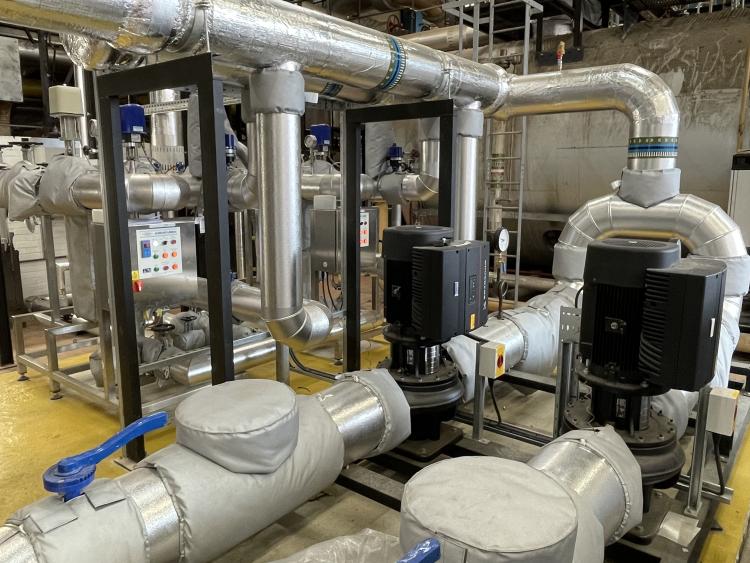Leeds Teaching Hospitals sets its sights on becoming 'one of the greenest NHS trusts in the UK’
The NHS Trust’s strategy is to continue improving so they can provide outstanding quality care for patients, and has made an annual commitment to reduce its carbon footprint through the delivery of greener care.
Leeds Teaching Hospitals NHS Trust is one of England's largest and busiest acute hospital trusts, treating 1.6 million patients annually.
At 500,000 square meters, the Trust’s estate spans the whole of Leeds with seven hospitals across five sites.
The NHS accounts for 5% of the UK's carbon emissions. The Trust is working towards the NHS net zero target of 2040, but has also set the ambitious goal to become one of the greenest NHS trusts in the UK, delivering targeted decarbonisation projects
In a short video we’ve produced, Trust representatives praise the government’s Public Sector Decarbonisation Scheme for the role it has played in unlocking funding for decarbonisation projects that support these targets.

In the video, the Trust discusses how its successful bid for grant funding has supported large and complex fabric improvement, heat decarbonisation projects and the integration of renewable technologies. Works have been completed across its diverse estate which includes Victorian, listed properties through to modern constructed built properties providing a mixed range of essential services.
Trust executive director for estates and facilities, Craige Richardson said: “Without this funding we wouldn’t have been able to accelerate carbon reduction to the pace that we’re doing right now.”
The Trust was successful in securing a total of £21.3 million from Phase 1 and Phase 3a of the Public Sector Decarbonisation Scheme. We deliver funding for this scheme on behalf of the Department for Energy Security and Net Zero.
Its Phase 1 project focused on reducing the demand on carbon intensive steam generation at the St James’s University Hospital estate. Steam-based systems use a gas boiler to heat water which turns into steam, this steam then travels through a network of pipes to provide hospital buildings with heating and hot water and is also used for process, such as sterilisation.
To complete the phase 1 £12.96 million works, it disconnected the steam supply to Beckett Wing and connected the building to the Leeds PIPES district heating network. Beckett Wing is a 24/7 clinical space and home to discharge wards and outpatient departments.
The project also integrated heat pumps to the site’s energy centre. Heat pumps are a low-carbon technology which generates heat using electricity to transfer thermal energy using a refrigeration cycle, as an alternative to the traditional burning of fossil fuels to generate heat.

A further £8.4 million from Phase 3a of the Public Sector Decarbonisation Scheme enabled a phased approach to the ‘de'-steaming’ of another 11 plant rooms, which are now supplied via the innovative low-carbon heat network at St James’s University Hospital. The network is supplied with process heat from the Combined Heat & Power (CHP) plant, the Heat Pumps & a bulk transfer connection to Leeds PIPES, enabling significant energy & carbon savings, whilst providing a resilient engineering solution
The Leeds PIPES network currently uses heat created as a by-product from burning non-recyclable waste (including waste produced by the five Trust hospitals) to provide homes, businesses and public buildings with heat and hot water. It is affordable, reliable and low-carbon.
Trust energy experts estimate that the Phase 1 and 3a projects will result in 5,490 tonnes of annual carbon savings with an annual financial saving of £500,000.
The trust has been steadfast on cutting its carbon emissions for some time, having previously undertaken several energy efficiency improvements at the St James’s Hospital site. This included the installation of LED lighting, double glazing and ventilation upgrades, improvements to building and pipework insulation.
When asked about the essential factors in the success of this project, the Trust emphasised the importance of staff buy-in from every level of the organization.
Interviewee and Trust executive director estates and facilities Craige Richardson said: “We’ve got buy-in from ward to board in terms of sustainability. And our estates and facilities teams are really passionate about making our sites more efficient in terms of carbon reduction.”
In our video, Craige emphasised the significance of the Trust’s role as a leading example of climate action to the communities in Leeds. He said: “Being a large anchor institution across Leeds, we’ve got a big role to play across the city.
“We can show people that we are taking this seriously and our actions really show that.”
Kiara Sagoo, our client support officer who has been working with the Trust, said: “It's inspiring to see the commitment Leeds Teaching Hospitals has made to decarbonisation, these PSDS projects have been a testament to their values and they strive towards a better future.
“Net zero is imperative not just for the environment, but for public health as well, and Leeds is paving the way for a greener and healthier future.”
Leeds Teaching Hospitals NHS Trust was one of nine organisations interviewed in a 36-minute documentary celebrating progress toward a net zero public sector in England.
You can watch the full documentary on our YouTube channel.




